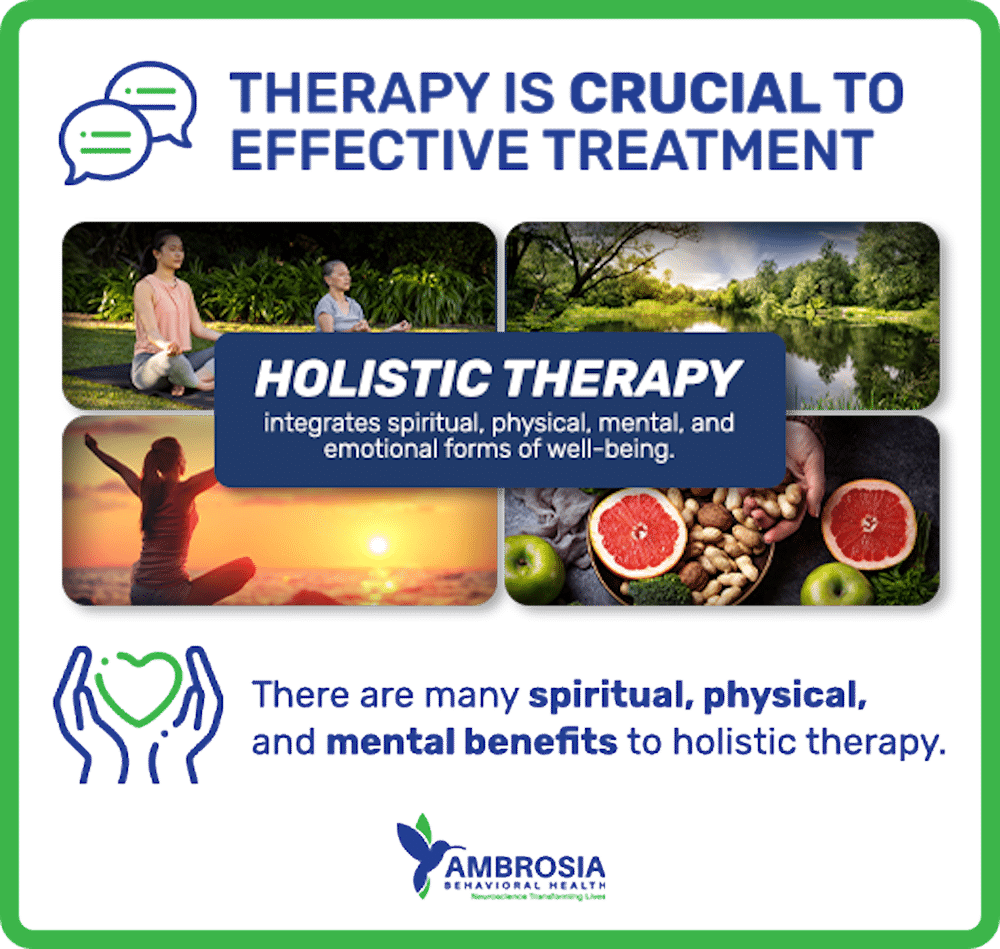Holistic Addiction Recovery in West Palm Beach, FL – Ambrosia
In the ever-evolving landscape of healthcare, there has been a significant shift over the past several decades toward integrating more comprehensive and inclusive treatment modalities.
This trend has seen traditional medical treatments complemented by alternative or holistic therapies to address a broad spectrum of health issues. This shift has significantly influenced substance abuse and addiction treatment.
Holistic addiction treatment stands as a testament to this progressive approach, offering a multi-dimensional perspective on recovery. It is increasingly being adopted by addiction treatment centers across the United States, reflecting a growing recognition of its effectiveness as an evidence-based approach.
Unlike conventional treatments that primarily focus on the physical aspects of addiction. Addiction is not just a biochemical imbalance but a symptom of broader emotional, psychological, and spiritual distress.
At Ambrosia Behavioral Health in West Palm Beach, Port St. Lucie, and Singer Island, Florida, we’ve seen successful outcomes from utilizing alternative treatment methods in conjunction with conventional ones.

What are the Different Types of Holistic Therapy?
The health benefits of getting outdoors have been well-documented for decades. Even just spending 20 minutes a day outside can help improve your immediate mental health. Sunlight helps the body produce vitamin D — an essential nutrient for keeping bones, muscles, and teeth healthy and strong. Indoor air quality can contribute to chronic respiratory illnesses, so getting outside helps boost our immune system.
Spending time outdoors can also help improve physical symptoms, including:
- Reducing stress
- Improving concentration
- Lowering blood pressure
- Reducing anxiety and depression symptoms
Anxiety, depression, and PTSD symptoms can take you out of the present moment and cause a spiral of negative thoughts and emotions. Therapy and medication are helpful tools for managing the root cause of anxiety and depression. However, meditation is an incredibly helpful resource for managing symptoms before they start.
Numerous studies have tested the effectiveness of using meditation and mindfulness to treat anxiety, depression, and panic disorders. Overwhelmingly, the evidence indicates that regular meditation practices reduce anxiety and depression symptoms by:
- Helping you stay focused in the present moment
- Providing a new perspective on stressful situations
- Giving insight into triggers
- Teaching breath work that can have a calming effect
- Building stress-management skills
Physical activities like yoga and meditation are both practices that help redirect the mind to the present moment. Practicing yoga tends to be more physical than a meditation practice, which is especially beneficial for people with anxiety and panic disorders, who may find sitting still uncomfortable. The focused deep breathing involved with yoga (and meditation) can be calming, reducing emotional responses to external triggers — even outside of practice.
Yoga has the added benefit of being a physical exercise, and almost all exercise produces endorphins and increases the brain’s oxygen supply. These effects help lower stress and make you feel better overall.
Acupuncture originated in China and has been used for millennia as a practice. In the last several decades, it has been integrated into more Western medicine practices due to its efficacy in treating a host of physical and behavioral health disorders.
As a complementary, holistic therapy, acupuncture has proven to be especially helpful in alleviating symptoms of certain mental health disorders, like depression. One of the primary benefits of acupuncture is its effect on areas of the brain known to react to stress and pain, by promoting a more relaxed and less reactive mind.
There is no doubt that chronic pain can contribute to increased depression and anxiety symptoms. Pain can make everything from getting a good night’s sleep to engaging in day-to-day life difficult, if not near impossible. Massage and chiropractic care work to help realign the body and manage chronic pain, which can go a long way to alleviating depression and anxiety symptoms. Other benefits of massage and chiropractic services include:
- Relief from migraines and chronic headaches
- Reduce muscle tension — often a physical side effect of anxiety
- Induce a more relaxed physical state
It takes a concerted effort for most people to give their bodies the food they need — especially when processed and pre-packaged foods are more convenient. Compounding that fact is that people struggling with the symptoms of mental health disorders may not have the emotional energy to be mindful of healthful eating. However, inadequate nutrition can make depression and anxiety symptoms worse.
Nutritional therapy doesn’t just make your body healthier, but it’s beneficial for your overall state of mind. Learning about diets that support gut health, mental wellness, and mindful eating sets the framework for continued mental and physical health during and after treatment.
All too often, anxiety and stress are self-made entities stemming from an over-creative mind with no outlet. Artistic activities help you find that outlet for your creative properties. Most patients are surprised at how much of a stress and anxiety neutralizer Art therapy is. That’s because your creativity could be creating anxiety or stress for no underlying reason. In the words of Walt Disney, “Worry is a waste of imagination.” You can make the most of your creative abilities while managing your stress levels by joining art therapy today.



What are the Benefits of Holistic Addiction Treatment?
- Encouraging Active Participation in the Treatment Process: One of the primary benefits of holistic treatment is that it instills a sense of active involvement in your recovery journey. It encourages you to take responsibility for your well-being and engage more fully in your treatment. This can lead to a stronger commitment to recovery and greater resilience against potential relapses.
- Minimizing Side Effects of Prescription Medications: Prescription medications often come with a range of side effects that can sometimes deter patients from sticking to their treatment plan. Holistic treatments can help mitigate these side effects. For instance, practices like yoga or acupuncture can alleviate physical discomforts such as nausea, headaches, or fatigue often associated with certain medications.
- Providing Stress Management Techniques: Stress can exacerbate mental health issues and trigger addictive behaviors. Holistic treatments often incorporate various stress management techniques, such as meditation, mindfulness exercises, and deep breathing routines. These techniques equip individuals with the tools to manage their stress levels effectively, fostering mental tranquility and emotional balance.
- Enhancing Self-Esteem: Holistic therapies can play a vital role in boosting self-esteem. They often involve activities that promote self-discovery and self-expression, such as art therapy, music therapy, or journaling. These activities can provide a sense of accomplishment and help individuals cultivate a positive self-image, which can significantly contribute to the recovery process.
- Promoting a General Healthy Lifestyle: Lastly, holistic treatment encourages a healthier lifestyle overall. It often includes components like nutritional counseling, physical fitness routines, and practices promoting good sleep hygiene. These elements not only support the recovery process but also foster long-term wellness and vitality.
Holistic treatment offers a multi-dimensional approach to recovery. It addresses not only the symptoms of the disorders but also the underlying causes and the overall well-being of the individual. As such, it can be a valuable addition to any recovery and wellness plan.
What Does Holistic Therapy Treat?
All therapies, no matter which group they may fall into, are designed to deliver a balance between the mind, body, and spirit. While different from traditional medicine and behavioral health practices, holistic therapies are an excellent complement to well-rounded addiction treatment plans. One of the reasons for this is that holistic care addresses areas of one’s life that are not always addressed inside a doctor’s or therapist’s office. Your holistic treatment team also considers the following:

Emotional Distress
Deep-seated pain from your childhood or painful memories of events experienced when actively abusing drugs or alcohol can keep you continuing to use. Without addressing emotional distress, attempting to recover from a drug or alcohol addiction can be nearly impossible. Holistic treatment helps address the imperative aspect of your life with practices such as meditation or yoga. These practices can help you manage your emotional distress in healthier ways, freeing you from turning to the use of drugs and alcohol to cope.

Physical Pain
Physical pain is a common component of one's desire to abuse drugs or alcohol, as dealing with it regularly can be highly distressing. Drugs and alcohol can feel like a quick and easy way to manage the pain. But when engaging in holistic care, you can learn about the benefits of massage therapy, reiki, tai chi, and other forms of holistic therapy that can address any pain you have so you do not feel the need to drink or use drugs.

Boredom
Many people recovering from addiction may feel their lives lack some excitement and everyday life is boring. They may have difficulty finding out what their interests are or have a hard time transitioning into a sober lifestyle. Boredom is the enemy of recovery, which is why it is imperative to avoid regular boredom. One of the ways to do this is to utilize holistic approaches to help calm your inner voice, allowing you to feel less compelled to use it again. Regular exercise can be a great outlet.

Nutrition
Nutrition is a big component of holistic therapy. Many people in recovery are in a nutritional deficit due to using substances. Holistic treatment programs are designed to promote overall health by addressing the mind, body, and spirit. They can significantly contribute to physical health in several ways. They can reduce stress and tension, improve the immune system, improve sleep, and encourage physical activity.
Techniques such as yoga, meditation, and massage therapy help to reduce stress and tension in the body. This relaxation can lower blood pressure, reduce heart rate, and improve digestion, all of which contribute to better physical health. Holistic therapy like acupuncture can help strengthen the immune system. They do this by stimulating the body’s natural defense mechanisms, making it better equipped to fight off illness and disease.
By treating the whole person rather than just focusing on specific symptoms, holistic addiction recovery can lead to improved overall health, increased energy levels, and a greater sense of self.
Holistic Addiction Treatment in West Palm Beach, Florida
- Health history – We gather your health history to better understand what foods may or may not be good for your diet. This includes learning if you have underlying conditions such as diabetes or celiac disease.
- Drugs of choice – Different substances create different health problems and deficiencies. We will work extensively with you to learn more about your drug of choice, how much you are using, and at what rate so we can modify your meal plans.
- Favorite foods – We want to know which foods you love so that we can include them in your meal plan in a healthy manner.
- Cooking habits – You will learn more cooking skills (if applicable) that can help you maintain a healthy diet long after you complete treatment at Ambrosia.
It is essential that during your addiction recovery, you focus on taking care of yourself. That means mentally, physically, emotionally, and spiritually. With the inclusion of holistic treatment into your treatment plan, you can achieve these goals and continue to utilize them in your long-term recovery. If you or your loved one needs help, start the admissions process.

Dr. Alam is an internationally renowned psychiatrist with academic affiliations with Northwestern University and University of Illinois, Chicago where he completed his residency training. He has been a principal investigator for over forty studies and has been involved in research leading to the approval of most psychiatric medications currently on the market. He is the founder of the Neuroscience Research Institute which continues to conduct research on cutting edge medication and interventional psychiatry. Dr. Alam is a Distinguished Fellow of the American Psychiatric Association and the American Society of Addiction Medicine. He has won several awards and has been featured extensively on radio and television.


